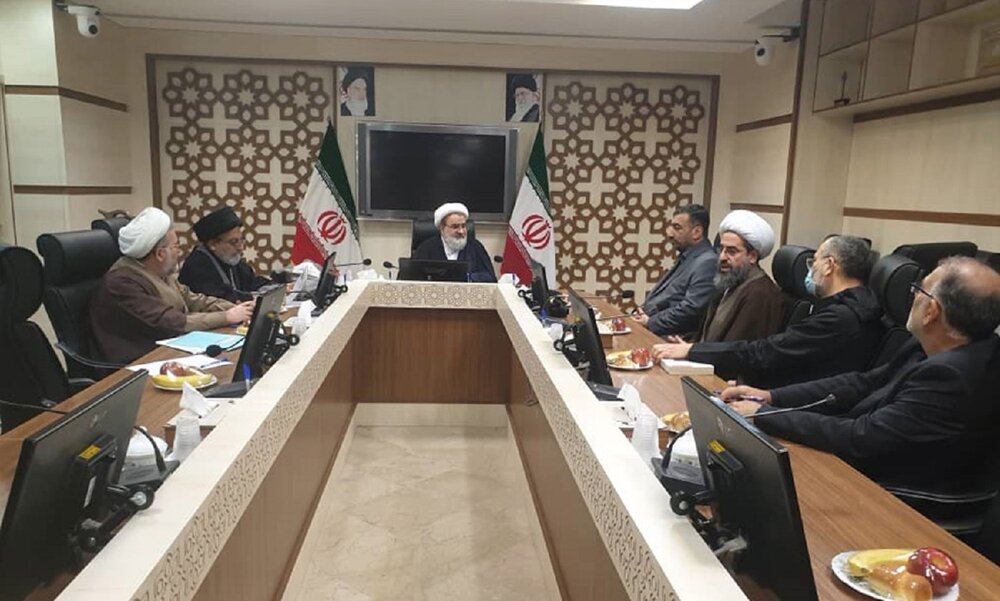Hawzah News Agency – The meeting of the members of the Secretariat of the Scientific Conference of the Umana al-Rusul was held with Dr. Salim Abdul Zahra Al-Jesani.
In this meeting, which was held at the Center for the Management of Islamic Seminaries, while welcoming the guests and congratulating the Mab’ath of the Holy Prophet (p.b.u.h), Hojat al-Islam Reza Eskandari considers the main goals of the Secretariat of the Scientific Conference of the Umana al-Rusul (Trustees of the Messengers) as the commemorating the prominent Ulama who have influential scientific achievements.
In addition, he included areas such as Fiqh and Osul, Etrat, Imamate and Wilayah, Quran and Hadith, history and Sirah, ethics and education, Hijrah and propagation, Jihad and confronting oppression, unity and approximation, as the areas in which the Shiite figures were active during their blessed life, and the secretariat of the conference had chosen them as the themes of the conference activities.
The secretary of the Conference Umana al-Rusul (Trustees of the Messengers) announced Ayatollah Sayed Mohammad Mahdi Musawi Al-Khersan, as the first scientific figure selected by the Secretariat of the Conference to be commemorated and introducing his works to the scientific community. “Ayatollah Al-Khersan, who came from an influential family in various political, scientific, social and religious fields, is a figure who has spent 7 decades of his blessed life to research, scientific activity and writing valuable works,” he said.
Following the meeting, the secretary of the conference stated that the secretariat of the conference seeks scientific interaction between the seminaries, especially Najaf and Qom. A report on the activities of the Secretariat over the past two years is also to be provided on issues such as holding thirty scientific meetings in person and virtually, collecting the works of Ayatollah Al-Khersan, as well as compiling a collection of articles and scientific interviews about his scientific personality, interaction between the seminaries of Qom and Najaf, in the form of an encyclopedia that will have about 50 volumes, including 45 volumes of his works, 2 volumes of his articles, and 1 volume of scientific interviews with him. Also, a software is going to be set up for the Ayatollah Al-Khersan’s collection of works.
Expressing his satisfaction with the coordination and cooperation of the management office of the shrines of Imam Hussain (a.s.) and Imam Ali (a.s.) in Iraq in holding the conference, Hojat al-Islam Eskandari expressed his hope that the management office of other holy shrines and scientific centers in Iraq will participate in this valuable action and play an active role so that, God willing, the ground for proper interaction between Shiite seminaries in the world will be provided.
Following the meeting, while announcing the readiness of the Holy Shrine of Imam Ali (a.s.) for the proper and glorious holding of this conference and other conferences in Iraq, Dr. Salim Abdul Zahra Al-Jesani, a member of the Board of Trustees of the Shrine, referred to the forming a scientific group of thinkers and researchers for the conference in Iraq and said, “God willing, we can introduce the valuable scientific activities of Ayatollah Sayed Mohammad Mahdi Al-Khersan.”
Hojat al-Islam Mohammad Taqi Rabbani, head of the scientific committee of the conference Umana al-Rusul (Trustees of the Messengers), said, “The Shiite school, due to its seminaries, and with the blessing of its great Ulama, has been able to create a suitable capacity for the growth and promotion of Islamic sciences and the enlightening teachings of the AhlulBayt (a.s.). In addition to informing and call for scientific articles for researchers in Iraqi scientific centers, we can benefit from the valuable opinions of Ulama contemporary with Ayatollah Al-Khersan, in the form of scientific interviews because they are unable to write articles due to old age.
Hojat al-Islam Sayed Monzer Hakim, a member of the Scientific Committee of the Conference, referring to the successful experience of the Conference Secretariat in Iran for the interaction and synergy of scientific centers and institutions - which has led to honorable meetings – called for the same process to be implemented in Iraq.
In the end, while pointing to the need to use all the scientific capacities of research centers and associations in Iraq to collect appropriate articles in the remaining time until the holding the conference, the Secretary of Conference appreciated the presence of esteemed representatives in the meeting.
Dr. Hannah Alexander, a Christian priest and prominent Vatican figure, was another guest at the meeting.
Referring to the peaceful coexistence of Christians and Muslims in Lebanon, he described the Prophet of Islam as valuable, respected, and exemplary person.


Your Comment